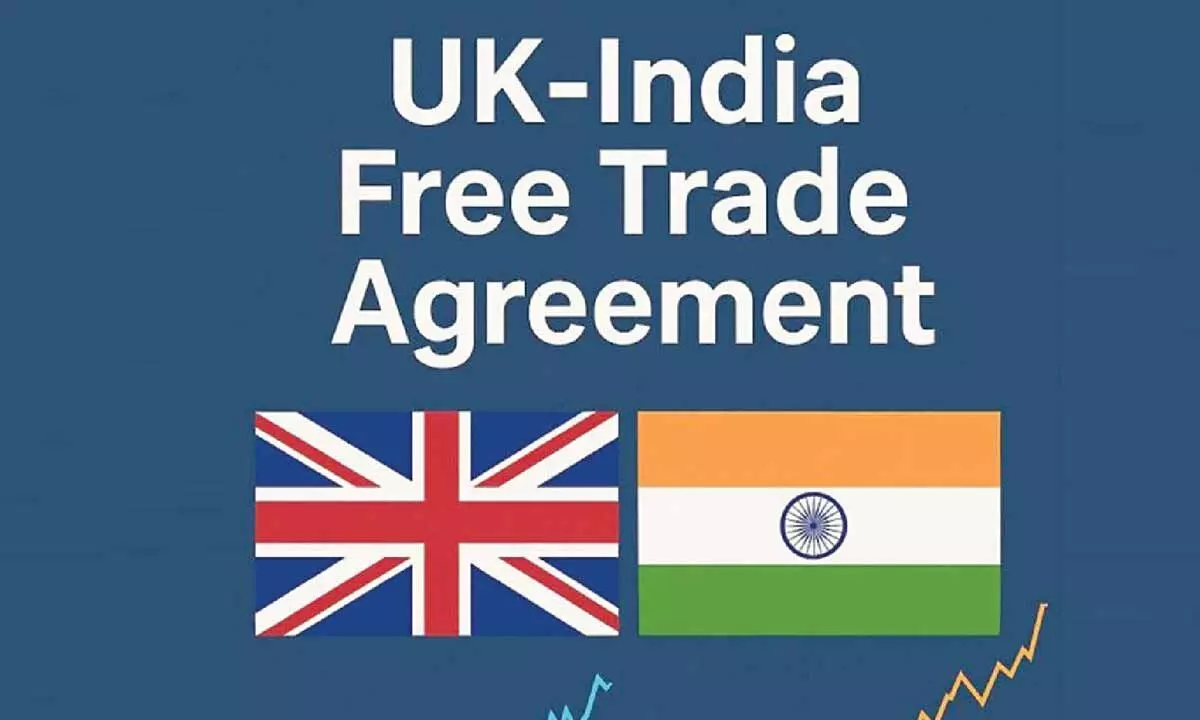728x90 - Google Ads
728x90 - Google Ads
336x280 - Google Ads
FTA needs some safeguards

336x280 - Google Ads
The India-UK FTA is, no doubt, a landmark deal that will boost economic ties, strategic cooperation and better access to Indian paroducts like textiles, leather goods, fisheries and agriculture products in the UK markets
300x600 - Google Ads
The India-UK FTA is, no doubt, a landmark deal that will boost economic ties, strategic cooperation and better access to Indian paroducts like textiles, leather goods, fisheries and agriculture products in the UK markets, while their products like whisky, automobiles and electronic goods can help India to develop industrial products at a cheaper rate and export them to other countries.
This agreement is expected to double bilateral trade by 2030. However, it is important to note that CETA (Comprehensive Economic and Trade Agreement) excludes India’s most sensitive agriculture sector and India has not given any tariff concessions on dairy products.
On the other hand, India’s MSMEs may face stiff competition from UK's imported products. Given this situation, the government should evolve a multi-pronged strategy to safeguard agriculture and MSMEs sectors to reap the fruits of the Free Trade Agreement.
Ravi Nishanth,Bengaluru
CETA: A blueprint for prosperity
TheIndia-UK Comprehensive Economic and Trade Agreement (CETA) marks a major turnaround pact as it eliminates tariffs on 99 per cent of India’s exports, including basmati rice, millet, spices, cotton and seafood, while safeguarding sensitive sectors like dairy and vegetables. The $5.5 billion seafood market now enjoys zero tariffs, and access is granted to British whisky and automobiles under a quota.
The $56 billion bilateral trade is set to double by 2030. There is no doubt that India will benefit in textiles, leather, gems, and IT services, while the UK gains in tea, seafood, and clothing. Easier visas for Indian professionals and support for start-ups ensure mutual growth, while simultaneously reducing dependence on the US and its coercive trade tactics.
RS Narula,Patiala
FTA is a reality, finally
Thesigning of CETA (Comprehensive Economic Trade Agreement) between India and the United Kingdom marked the end of a four-year wait for the Free Trade Agreement (FTA) between these countries. In the intervening period there were 16 rounds of negotiations during which the UK had four Prime Ministers, including three from the Conservative Party.
Ironically, the deal was signed by the Labour Party PM Keir Starmer. However, the deal will come into force only when it is ratified by the UK Parliament. Reportedly, the deal will benefit farmers, MSMEs, footwear and jewellery exports from India as tariffs on these items are likely to be reduced significantly. Further the deal has not touched existing tariffs on lamb and salmon, so there is no threat to these sectors. On the other hand, British whiskey and cars will be available in India with the reduction in their tariffs from the present 150 per cent to 70 per cent and down to 40 per cent in the next 10 years. Indian service sectors will benefit immensely as would yoga coaches, musicians and chefs.
Meanwhile, there is some criticism on the deal from both sides. The deal has been struck even as the UK waits to recover from losses caused by Briexit. The three-year exemption from NIC to the labour from India dents its income to £10 lakh as per the estimates of Conservatives. Meanwhile, Indian MSMEs are worried by the entry of British auto spare parts and their impact on their business. There is also no clarity on Carbon tax, which affects industries like steel, aluminium, cement and fertilizers.
Pratapa Reddy Yaramala, Tiruvuru (AP)

